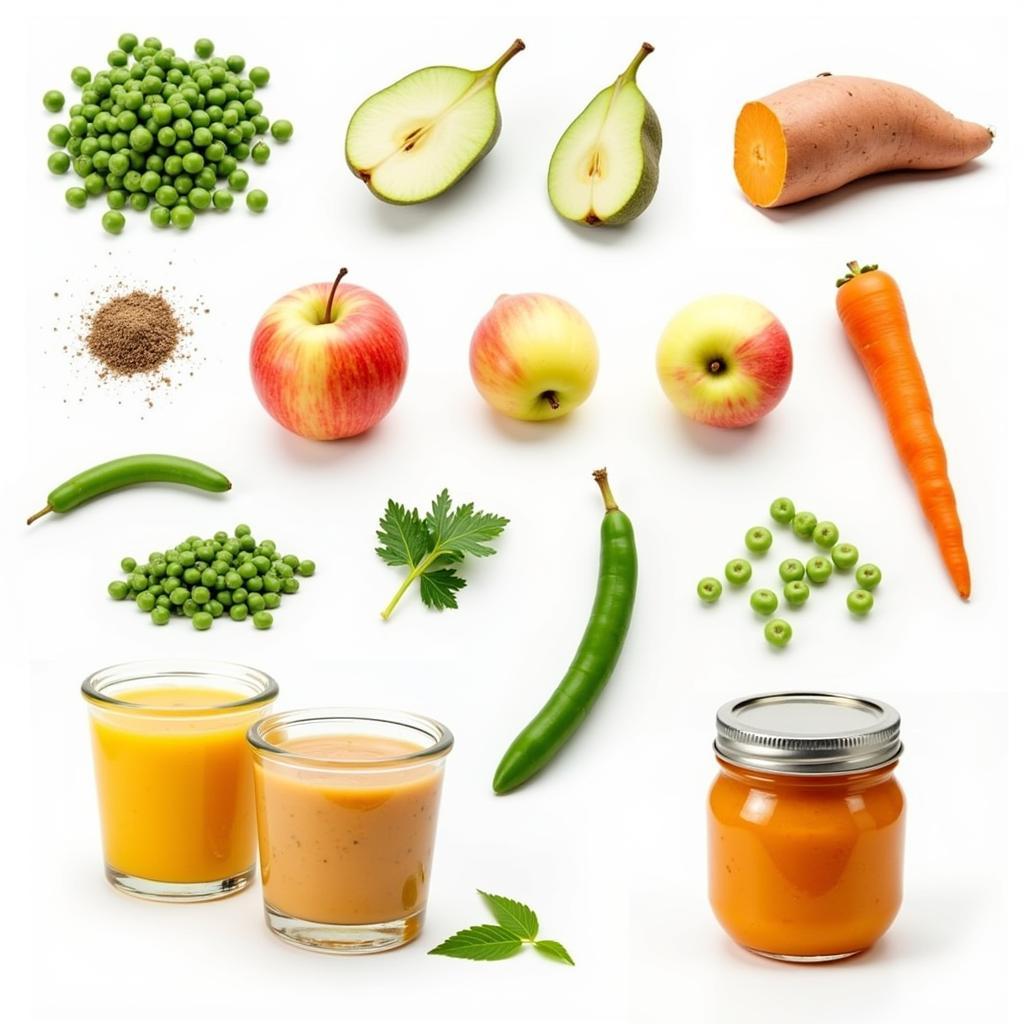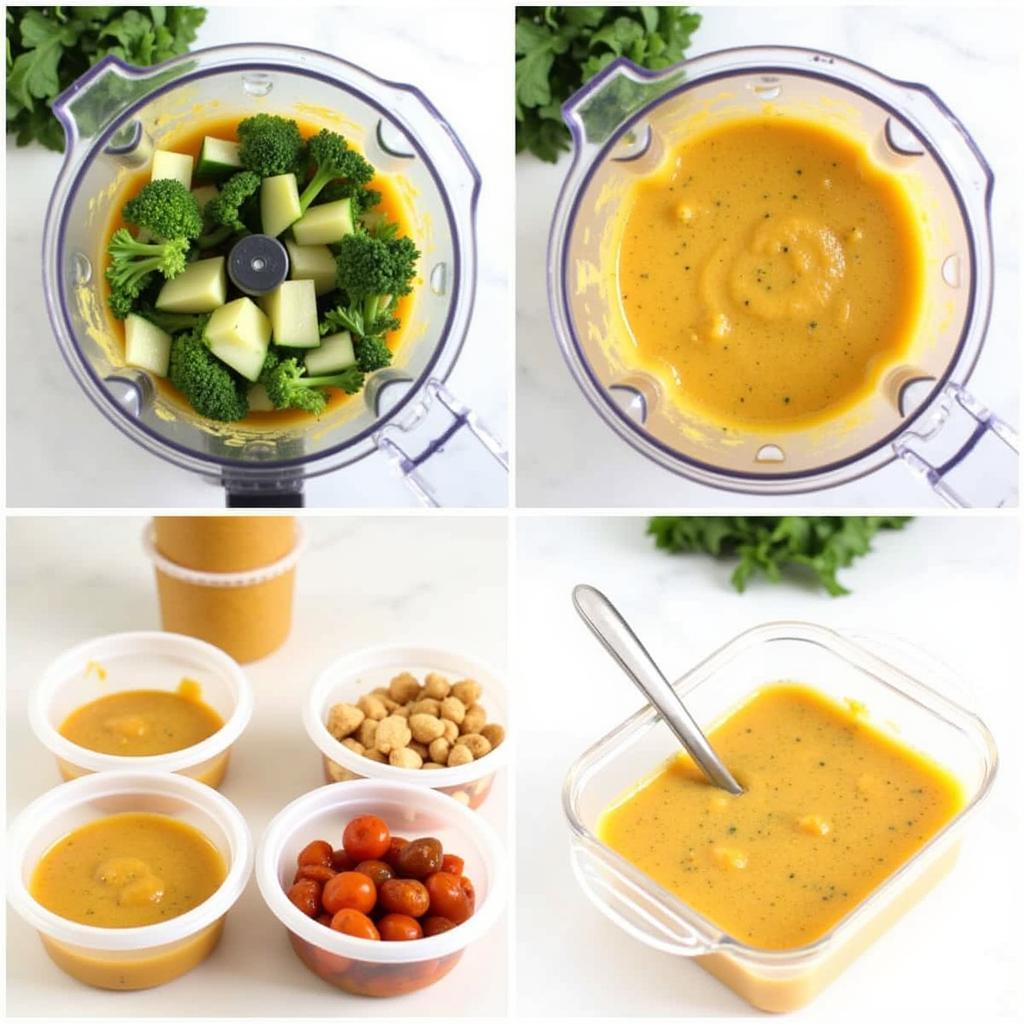Starting your baby on solids is a big milestone, and choosing the right Stage 1 Organic Baby Food is crucial for their healthy development. This guide provides everything you need to know about introducing stage 1 organic baby foods, from understanding their benefits to choosing the best options for your little gourmand.
Why Choose Stage 1 Organic Baby Food?
Organic baby food offers several benefits for your little one. It’s made with ingredients grown without synthetic pesticides, herbicides, and fertilizers, minimizing exposure to potentially harmful chemicals. This is especially important during the first year when your baby’s immune and digestive systems are still developing. Organic farming practices also tend to be more sustainable, benefiting the environment and supporting biodiversity. Moreover, many parents find that organic baby foods have a cleaner, fresher taste that their babies enjoy. When looking at pureed food pouches, ensure they are organic. Looking for more information about Gerber products? Check out our Gerber sitter foods guide!
 Fresh Organic Ingredients for Stage 1 Baby Food
Fresh Organic Ingredients for Stage 1 Baby Food
Getting Started with Stage 1 Organic Baby Food
Introducing solids should be a gradual process. Around six months, most babies show signs of readiness, such as good head control, the ability to sit with support, and an interest in food. Start with single-ingredient purees, like sweet potato or carrot, to easily identify any potential allergies. Offer a small amount (1-2 teaspoons) once a day, gradually increasing the quantity and frequency as your baby gets accustomed. Observe your baby closely for any reactions and consult your pediatrician if you have any concerns. You can also find further insights in our baby food book.
Choosing the Best Stage 1 Organic Baby Foods
Not all stage 1 organic baby foods are created equal. Look for brands that prioritize quality ingredients and transparent sourcing. Check the labels carefully for certifications, such as USDA Organic, which guarantees that the product meets strict organic standards. Consider the texture and consistency, opting for smooth, easily digestible purees. Avoid added sugars, salt, and artificial flavors. Variety is also key to ensuring your baby receives a wide range of nutrients. Explore different fruits, vegetables, and grains to discover your baby’s preferences. Learn more about Little Spoon baby food reviews for a comprehensive look at popular brands.
Making Your Own Stage 1 Organic Baby Food
Making your own stage 1 organic baby food is a rewarding experience. It allows you to control the ingredients and ensure the freshest possible meals for your little one. Simply steam or bake organic fruits and vegetables until tender, then puree them using a blender or food processor. You can also find detailed instructions and recipe ideas in our Gerber 12 month food guide.
Common Questions About Stage 1 Organic Baby Food
- When should I introduce stage 1 organic baby food? Around six months, when your baby shows signs of readiness.
- What are the best first foods to try? Single-ingredient purees like sweet potato, carrot, or avocado.
- How much should I feed my baby at first? Start with 1-2 teaspoons and gradually increase the amount.
- Can I freeze homemade baby food? Yes, freeze in ice cube trays or small containers for easy portioning.
- What if my baby has an allergic reaction? Stop feeding the food and consult your pediatrician.
 Preparing Homemade Stage 1 Organic Baby Food
Preparing Homemade Stage 1 Organic Baby Food
Conclusion
Introducing stage 1 organic baby food is a significant step in your baby’s journey. By choosing organic and following these guidelines, you can provide your little one with a nutritious and healthy start to their lifelong relationship with food. Stage 1 organic baby food offers a great way to nourish your growing baby.
FAQ
- What are some common stage 1 organic baby foods? Pureed fruits and vegetables like apples, bananas, carrots, and sweet potatoes are common.
- How can I tell if my baby is ready for solids? Look for signs like good head control, sitting with support, and showing interest in food.
- Should I warm baby food before serving? It’s not necessary, but some babies prefer warmed food.
- How do I store leftover baby food? Refrigerate in an airtight container for up to 24 hours.
- Can I mix different stage 1 organic baby foods? Yes, once your baby has tried each food individually.
- What if my baby refuses stage 1 organic baby food at first? Don’t force it. Try again another day.
- Where can I buy stage 1 organic baby food? Most grocery stores and online retailers carry a variety of brands.
Need more information? Explore our articles on pureed food pouches.
For any assistance, please contact us at Phone Number: 02437655121, Email: minacones@gmail.com Or visit us at: 3PGH+8R9, ĐT70A, thôn Trung, Bắc Từ Liêm, Hà Nội, Việt Nam. We have a 24/7 customer service team.